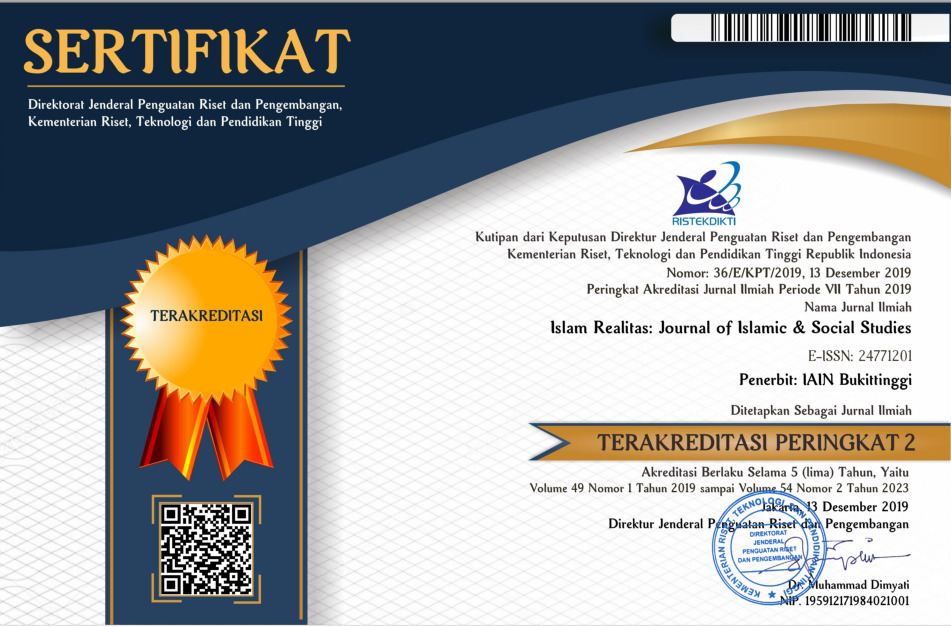Bhineka Tunggal Ika Village: Patterns of Religious and Cultural Relations in a Local Wisdom-Based Multireligious Society
DOI:
https://doi.org/10.30983/fuaduna.v6i1.5526Keywords:
Bhineka Tunggal Ika Village, Religios Tolerance, Multireligious SocietyAbstract
This article aims to find a pattern of relations between religion and culture in Banjarpanepen Village as a miniature portrait of Bhineka Tunggal Ika Village, which upholds mutual respect and tolerance in social and religious life. In the village, there are Muslims, Christians, Buddhists, and Indigenous Religion (Penghayat) who can live in harmony supported by the local cultural locality. This type of research is qualitative with an ethnographic approach and uses observation, interviews and documentation. Key informants were determined through purposive sampling, including the village, traditional, religious, and community leaders. The data obtained were then analyzed descriptively-analytically to reveal the facts that occurred theoretically and empirically related to the research focus. The results of this study indicate: (1) a portrait of the community's diversity, which includes religion, culture, and natural potential. In this case, the philosophy of cultural locality is used as the basis for every community social activity. (2) Community communication patterns include social relations, cultural customs and religion. Finally, (3) the strategy to realize Bhineka Tunggal Ika Village is to strengthen the role of religious leaders, strengthen the tradition of cooperation, make local wisdom a cultural strategy in realizing tolerance and develop a tourism village based on local wisdom.
References
Abidin, M. Zainal. “Islam Dan Tradisi Lokal Dalam Perspektif Multikulralisme.†Millah 8, no. 1 (2009): 299–309.
Affandi, Nurkholik. “Harmoni Dalam Keragaman (Sebuah Analisis Tentang Konstruksi Perdamaian Antar Umat Beragama).†Jurnal Komunikasi Dan Sosial Keagamaan 15, no. 1 (2012): 71–84.
Ajidin, Zilal Afwa. “Praktik Dialog Antar Umat Beragama.†Poros Onim: Jurnal Sosial Keagamaan 1, no. 1 (2020): 68.
Alfariz, Fitri. “Analisis Nilai Religiusitas Sebagai Penguatan Toleransi Di Desa Pancasila Lamongan Jawa Timur.†Jurnal Filsafat Indonesia 4, no. 1 (2021): 118–23.
Azizah, Imroatul. “Model Pluralisme Agama Berbasis Kearifan Lokal ‘Desa Pancasila’ Di Lamongan.†Fikrah 8, no. 2 (2020): 277–94. https://doi.org/10.21043/fikrah.v8i1.
Erningtyas, Tamarin, and Ahmad Arif Widianto. “Toleransi Antarumat Beragama Dan Relasinya Terhadap Pemeliharaan Kebudayaan Masyarakat Desa Pancasila.†Jurnal Integrasi Dan Harmoni Inovatif Ilmu-Ilmu Sosial (JIHI3S) 1, no. 2 (2021): 142–50. https://doi.org/10.17977/um063v1i2p142-150.
Gunawan. Sosiologi Agama: Memahami Teori Dan Pendekatan. Edited by Syabuddin Gade. Aceh: Ar-Raniry Press, 2020.
Haryanto, Joko Tri. “Kearifan Lokal Pendukung Kerukunan Beragama Pada Komunitas Tengger Malang Jatim.†Analisa 21, no. 2 (2014): 202.
———. “Local Wisdom Supproting Religious Harmony in Tengger Community, Malang, East Java, Indonesian.†Jurnal Analisa 21, no. 2 (2014): 202.
Izzati, Afina. “Kiai Sebagai Figur Toleransi Kearifan Lokal Di Lasem.†Fikrah: Jurnal Ilmu Aqidah Dan Studi Keagamaan 8, no. 1 (2020): 243–54. https://doi.org/10.21043/fikrah.v8i1.
Masduki. “Toleransi Di Masyarakat Plural Berbasis Budaya Lokal.†Sosial Budaya 14, no. 1 (2017): 14.
Miharja, Deni. “Persentuhan Agama Islam Dengan Kebudayaan Asli Indonesia.†Miqot 38, no. 1 (2014): 189–214.
Nasihuddin, Abdul Aziz. “Local Wisdom Within Protection and Management of The Environment (Study in Janggolan Village, Banyumas).†Bina Hukum Lingkungan 2, no. 1 (2017): 104. https://doi.org/10.24970/jbhl.v2n1.9.
Nurfitri, Aldila Dyas. “Toleransi Beragama Dengan Tepa Slira Dan Empan Papan.†In Rebitalisasi Toleransi Beragama Berbasis KEarifan Lokal, edited by DP. Budi Susetyo. Semarang: Penerbitan Universitas Katolik Soegijapranata, 2017.
Purna, I Made. “Local Wisdom of Mbawa Village Society in Building Religious Tolerance.†Jurnal Pendidikan Dan Kebudayaan 1, no. 2 (2016): 261–77.
Roibin. “Agama Dan Budaya: Relasi Konfrontatif Atau Kompromistik?†Jurnal Hukum Dan Syariah 1, no. 1 (2010): 1–7.
Sabarudin, and Mahmud Arif. “Kerukunan Hidup Antar Umat Beragama BErbasis Kearifan Lokal: Studi Kasus Di Kampung Loloan Kabupaten Jembrana Provinsi Bali.†Sosiologi Reflektif 14, no. 1 (2019): 7.
Setiyani, Wiwik. Keragaman Perilaku Beragama. Yogyakarta: Dialektika, 2018.
Sugiarti, Iis, and Moh. Roqib. “Diseminasi Pendidikan Moderasi Islam Pada Mahasiswa: Strategi Menangkal Radikalisme Di Perguruan Tinggi Umum The Dissemination of Moderate Islamic Education to Students : Strategies to Counter Radicalism in Public University.†Potret Pemikiran 25, no. 2 (2021): 123.
Supriyanto. “Religious Moderation in The Framework of Cultural Reservation in Banjarpanepen Banyumas.†Ibda’ :Jurnal Kebudayaan Islam 18, no. 2 (2020): 322. https://doi.org/DOI: https://doi.org/10.24090/ibda.v18i2.3910.
Wicaksono, Brian Demas. “Desa Kebangsaan: Merajut Tenun Kebhinekaan Dari Pedesaan.†Jurnal Universitas 17 Agustus 1945 Surabaya 1, no. 1 (2019): 116.
Interview
Diarjo, Yono (Christian Religious Leader), Interview, 25 Februari 2020
Karyonakum, Mad (Public Leader of Banjarpanepen Village), Interview, 25 Februari 2020
Maryono, Pandhita (Religious Leader of Banjarpanepen Village), Interview, 25 Februari 2020
Mujiyono (Head of Banjarpanepen Village), Interview, 25 Februari 2021.
Ratna, Dwi (Banjarpanepen Village Government Staff), Interview, 24 Desember 2020.
Roqib, Moh. (Head of FKUB Banyumas), Interview, 26 Februari 2020.
Supono, Marto (Traditional Leader of Banjarpanepen Village), Interview, 25 Februari 2020.
Turimin (Head of Pokdarwis Banjarpanepen Village), Interview, 25 Februari 2020.
Downloads
Published
How to Cite
Issue
Section
Citation Check
License
Copyright (c) 2022 Ulul Huda, Noor Asyik, Iis Sugiarti

This work is licensed under a Creative Commons Attribution-ShareAlike 4.0 International License.
Authors who publish with this journal agree to the following terms:
- Authors retain copyright and grant the journal right of first publication with the work simultaneously licensed under a Creative Commons Attribution-ShareAlike 4.0. that allows others to share the work with an acknowledgment of the work's authorship and initial publication in this journal.
- Authors are able to enter into separate, additional contractual arrangements for the non-exclusive distribution of the journal's published version of the work (e.g., post it to an institutional repository or publish it in a book), with an acknowledgment of its initial publication in this journal.
- Authors are permitted and encouraged to post their work online (e.g., in institutional repositories or on their website) prior to and during the submission process, as it can lead to productive exchanges, as well as earlier and greater citation of published work (See The Effect of Open Access).





